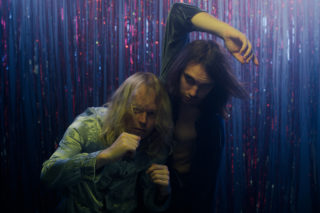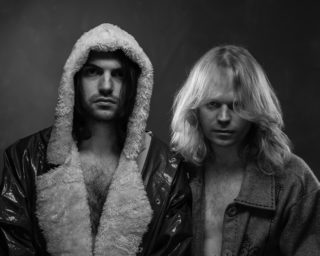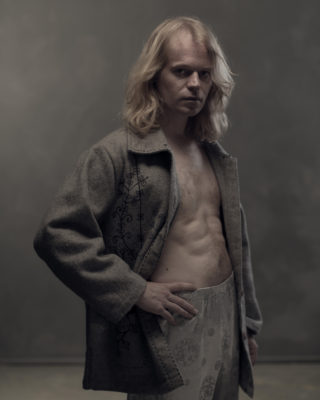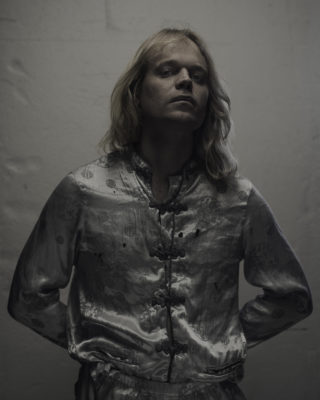The sensible madness of Connan Mockasin and Sam Dust’s new project, Soft Hair
Connan Mockasin and LA Priest are tired of music for music's sake

Connan Mockasin and LA Priest are tired of music for music's sake
Sitting down face-to-face with Connan Mockasin and Sam Dust in East London, I need to take a moment and re-calibrate my perceptions. Over the past few years, New Zealander Mockasin and England-born, Wales-based Dust have separately cultivated profiles as sort of retro-futuristic psychedelic lounge lizards; the former under his own name, the latter as LA Priest (you pronounce it “la priest”, by the way). Promotional shots for Soft Hair – the duo’s sort-of-new project together – see the two of them dolled up like Adam and Eve on Mars, replete with a ginormous yellow snake around their spray-tanned shoulders.
Not for nothing do I fully anticipate an encounter with a couple of equally large personalities when I take my place opposite 33 year-old Mockasin and Dust, 27, to discuss their self-titled debut album under their joint moniker. In fact, I’m greeted by a perfectly normal-looking couple of guys sipping on white wine, albeit both wearing hangdog expressions that belie a heavy few days on the promotional trail. Dust is kitted out in a faded black tee with his dark, stringy hair draped all over it and Mockasin, well, he’s wearing what looks suspiciously like a cable-knit sweater.
Where’s the coyly seductive, moustachioed tease from the cover of Mockasin’s 2013 ‘Caramel’ LP, I wonder? What about the prince of bizarre porno chic on the front of last year’s ‘Inji’ record from LA Priest? Throughout our chat together on a balmy September afternoon, it becomes clear that Mockasin and Dust revel in multimedia theatrical artifice; creative indulgence beyond the confines of their music and lyrics.
The surrealistic video for new single ‘Lying Has to Stop’ perfectly encapsulates the pair’s artistic ethos in action. Both writhe around in front of tinfoil-plastered walls, don a series of bizarre outfits and ultimately end up in the shower with Mockasin filming Dust with a hand-held camera as he rubs soap all over his chest. It’s absurd and, fundamentally, it’s all really just about escapism and having fun.
“There’s a little bit [of a theme] but not as much as you’d think,” says Mockasin. “We basically had a party at my friend’s house – Joseph Burt, who actually directed it with us – and we turned his bedroom into the silver room and just partied. We always have parties at his house. Also we had a nice 35mm camera, so we basically filmed the party and directed it a bit.”
There’s an unmistakable sense of playful homoeroticism to it all though, I say. “Well, when you get two boys together…” Mockasin begins, offering half a smile before he drifts off. “Actually the record’s a bit like that as well, isn’t it?”
“Yeah,” says Dust. “I think more than anything we were surprised very early on when we started working together how people interpreted our relationship, and now we just kind of…” Play up to it? “I don’t think we need to now. We don’t need to do anything; just stand next to each other and people will get that impression. It’s gone really weird actually because if you did that kind of stuff in previous decades nobody would bat an eyelid, now it’s gone back to people being sort of shocked again.”
Contrary to an erroneous press release, it turns out that the Soft Hair record we’re here to discuss was actually finished over five years ago – before Mockasin’s first album even hit the shelves. Back then, Dust was known as Sam Eastbourne and fronting dance-punk indulgers and NME darlings Late of the Pier. The foursome invited Mockasin to tour with them but he struggled to play his debut LP live, so Dust leant a hand playing bass on stage behind the scenes. Mockasin and Dust later decamped to the latter’s apartment in Nottingham to collaborate, before jetting to New Zealand and beyond with a minimal setup to finish the record. It’s been waiting for release ever since.
Given its relatively fractured origins – and delayed release – the level of consistency across the album is impressive. “It was all over the place, but we had such a simple setup from the start,” Dust says. “We really just stripped it down to one microphone, one instrument at a time kind of thing. It just meant wherever we recorded, you just knew it was going to fit the whole sound [of the album]. The travel thing only affects how I see the record now; nostalgically. I remember and have a certain fondness for parts of the record just because of the atmosphere and the emotional feeling.”
Emotional interpretation seems to be the best way of navigating the long-delayed LP, because trying to properly describe it is a fool’s errand. Sonically the eight songs seem to paint the blueprint for the two’s releases over the past few years; particularly Mockasin’s characteristic languid blend of seventies AOR, experimental pop and the avant-garde but also Dust’s more energetic, funk-orientated fare. Songs bleed into one another, voices transmogrify throughout and arrangements often contort in unexpected ways. It’s pop music – I guess – but it’s the strangest you’ve ever heard.
“I like meeting new people,” Dust sighs, “but I always feel really stupid when they ask what kind of… you know… it’s an honest question: ‘What kind of stuff do you make?’, and I’m just, ‘Uh…’ Sometimes you make stuff up, like, oh, electronic rock, or…”
“I just say rock music,” says Mockasin. “It stops the conversation right there.”

Thematically, there’s a lot going on beneath the surface. Take the third track on the record, ‘i.v.’. The instrumental kicks off with a jolt of organ before morphing into the kind of thing you’d hear on the soundtrack of an unflinchingly bleak sci-fi flick from the 1970s. Once you know the story behind the piece though, all those overbearing vintage synth lines – not to mention that title – take on altogether more significance.
“I fell ill, really, really sick for six weeks when we were travelling and making the record,” recalls Mockasin. “I couldn’t get seen to properly by the doctors so I got checked – short and sweet – but they couldn’t do proper tests. We carried on making the record back in Loughborough in Sam’s place and I was still really sick, so I started looking on the Internet for self-diagnosis and…”
Now it gets just a little bit weird. “I had a dream, just before I got sick, where I got pricked on the bus by a man with HIV. So I was convinced I had HIV. I was really unwell for six weeks and all the symptoms were lining up to what I was seeing on the Internet and that was obviously really depressing. Then I finally got the all-clear but it was pretty scary.”
Dust seems to remember the experience almost wistfully. “The thing is, I’d known Connan for quite a while by that point and it didn’t seem to be in bad taste to make a song that sounds a bit like a death march while he was suffering,” he says, turning to Mockasin mischievously. “I think it cheered you up a bit.”
There are elements of morbidity lurking elsewhere on the record too, like a car crash scene, which was to feature as part of a movie for which the record was intended as a soundtrack. In fact, the self-same film is now on the way, though the two want to remain tight-lipped about it. “Yeah, if we have our way, it’ll be out very soon,” says Dust. “It’s all written, it’s just not started being filmed. That’s the hardest part really, to write something. It’s been sitting on the shelf for years now.”
I get a sense of collective artistic restlessness and multimedia ambition between Mockasin and Dust that might well be the basis of the bond between the two. Neither seems particularly enamoured with the idea of just churning out records every couple of years. For starters – assuming people like the record – there are plans for a live show that stretches into the realms of the theatrical, as opposed to a bunch of blokes stood on stage just blazing through the set list. “It would be good to do something where we don’t compromise for once,” Dust offers rather cryptically. “That would be really nice.”

What does that mean though – that the idea of a bog-standard album and tour is a bit of a reductive compromise? “If you follow the advice of a typical A&R guy, or ask anybody in the industry, they’ll usually just say, ‘That’s great, all we need are two videos for singles, and you’ve got 10 tracks, and that’s an album’, then they’ll just be happy so long as you fill those criteria,” says Dust. “But conversely, if you do something different to that, the actual people buying or listening to records and finding out about things, they’ll be much more interested in what you’re doing if they see these little signs of change in what you do.”
Later on, he elaborates, telling me: “Music was never enough at any point for me. It’s always just been part of the many different things that I’ve done. I’ve gone through times of obsession and only thinking about music, just shutting everything else out and not caring about it, and then other times when I go for ages without thinking about music at all. You know, building things or just planning like a future house, or drawing. It just seems such a waste to limit yourself.”
To that end, Dust has certainly lived up to his credo. Over the past few years he’s done everything from building his own musical instruments to studying electromagnetic phenomena in Greenland, not to mention travelling to Iceland, Scandinavia and the USA. LA Priest has acted as a vehicle to express some of these experiences artistically but Dust is searching for more.
So too, it seems, is Mockasin. He’s currently developing a soap opera and an accompanying album (“It’s something I’ve been working on for nearly 20 years and I’m finally actually doing it now that I can”), and he’s exhibiting a collection of his paintings in Tokyo next year (“It’s all really pretentious stuff but it’s fun, I’m enjoying it,” he laughs). Like Dust, he also feels like working with music alone can be stifling.


“I know I’ve only released two records but – and it’s different doing this one with Sam, although maybe that’s why we didn’t put it out sooner – I find the whole process just gets boring. I was pretty bored by the second one. I do like making records, I just don’t like putting them out.”
Life on the road can be tedious too, he says. “I think we both get discontent, itchy, bored – you know what I mean – with music. I know some people will walk into a venue and it’s, ‘Oh yeah, let’s check out the PA, cool, let’s do a sound check’, and…”
“It can be sterile,” says Dust.
“I’m jealous of people that get obsessed with music and guitars,” continues Mockasin. “I wish I could get obsessed with guitars! I was into guitars when I was a child, and that’s when I would play every day for two years and that’s how I managed to be able to play guitar, but I wish I was like that now.”
I wonder then, where does that place the Soft Hair record within the context of everything else going on? Hearing Dust and Mockasin talk about music, both obviously have ambitions for the project far beyond eight tracks and 32 minutes or so. Combined with the stage show, the film and the music videos, maybe the two are asking for a lot of commitment from their listeners?
Mockasin certainly still sees the record as a worthwhile experience on its own. “It’s kind of nice – it’s very nice, actually – for people to just listen to it as a record, without having to have the kind of, ‘Well what’s the story behind that?’ Just to enjoy it for the record, and then later, if they like it, it might make more sense.”
“You know, fans really love listening to demos of songs,” proffers Dust. “I like that as well; when I hear a demo of a Prince song, it’s just somehow fascinating in a way. Well we didn’t really have demos for this record – most of these songs are the final master recordings – but in a way the film was the ‘demo’. The film was kind of the starting point for a lot of these ideas. So putting out the film is kind of like giving people the demos. It doesn’t really matter how it comes out, because that’s what it is. It doesn’t matter if the production values aren’t, you know… it’s the sketch pad.”
“Great answer,” Mockasin says, affectionately patting his bandmate on the back.
“It’s taken me three days to think of that,” sighs Dust. “Well, five years.”